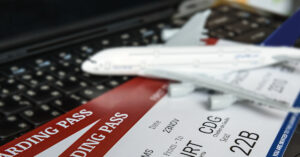As many travel agents view it, providing airline tickets isn’t a real business—it’s a giveaway. Since domestic tickets don’t pay commissions, they serve as loss leaders for compensation paid by cruise lines, hotels, resorts, and escorted tour providers. Selling Business Class and First-Class air tickets is a different matter due to the huge commissions paid, but they probably account for no more than 10-15 percent of the tickets that pay nothing.
The lack of financial incentives isn’t the only problem. Unless your business is large enough to justify a GDS, you spend much of your work life waiting on “hold” for airline service personnel, or listening to Sally explain why she can’t fly on Saturday or needs a window seat.

As the infomercials say, “There’s got to be a better way.” Well, the cavalry has arrived. It’s called dynamic pricing. As Andrew Curran says in his article, Passengers Learn To Adapt As Airlines Adopt Dynamic Pricing, “Airlines know a lot about their passengers, dynamic pricing harnesses that knowledge.”
Price movements in airline prices can be worse than penny stocks: Tickets can go up and down by hundreds of dollars within days. I was booking roundtrip Business Class flights from Los Angeles to Cape Town for two clients that jumped from $7669 to $8170 overnight. They then dropped back to the lower price the next day.
According to the Price History tab on googleflights.com, the price for these flights on the designated flying days has varied by $800 per ticket in the last seven days. The ones I bought for clients are nonrefundable, but exchangeable, for tickets purchased later. This raises the possibility of travel advisors, resellers, or travelers tracking prices daily or hourly; and exchanging or buying when it’s advantageous. Right now, some airlines are trying to restrict these practices, but this may change if resales can become an additional income stream for airlines and travel advisors.
Elon Musk at Tesla is showing us how to do this. He is planning for Tesla to augment its profits from car manufacturing by renting buyers’ cars whenever it’s convenient for owners. Tesla electric cars are on the verge of being approved as self-driving autos which—if Elon has his way—will disrupt the auto rental and taxi businesses by permitting a self-driving Tesla to take people from Point A to Point B whenever the owner chooses to make it available. Tesla will provide the software and split the income with the owners. In a televised interview last week, Musk estimated that this will increase Tesla’s earnings many times.
How does this relate to selling and exchanging airline tickets? Simple. Permit airline tickets to be sold and resold up to flight time with “change fee” revenues split between the airlines, resellers, and travel advisors. If the airline received a portion of the change fee every time a ticket changed hands, profit could increase dramatically for everyone. This would incentivize travel advisors to make their clients aware of falling prices and exchange their tickets for new ones.
Doing this with the present GDS and retail sales software would heighten the travel nightmare. But, by adapting software that is presently used for buying, settling, and reporting stock prices, the process of ticket reselling would become simpler and less expensive. Also, by augmenting customer information to include improved security watchlists, flying could become safer with fewer disruptions.
Maybe the reason that Google has withdrawn from airline ticketing was that they realized they could increase their revenues even faster by developing and selling dynamic pricing systems that could also support multiple reselling opportunities. There’s no way of knowing if they had this in mind when they changed direction, but this is certainly a reasonable explanation.
The major credit companies such as Amex and Visa could also opt to provide these systems, given they are so strongly embedded in both the travel supplier and travel consumer camps. This could be a tangible example of using technology to benefit airlines, travel advisors, and consumers simultaneously.
As with the Tesla example, converting every ticket sale to an opportunity for recurring income can dramatically affect a travel agency’s bottom line. It can also reduce the need for agencies to charge consulting fees and result in cost savings for consumers. It could also provide a service that individual buyers might have problems obtaining.
 Dr. Steve Frankel and his wife have cruised on most of the Seabourn, Silversea, Crystal, Azamara, Oceania, Regent, and Windstar ships. Steve is the founder of Cruises & Cameras Travel Services, LLC. He has been recognized as a “2021 Top Travel Specialist” by Conde Nast Traveler magazine and a “Travel Expert Select “by the Signature Travel Network. His specialties are luxury small-ship cruises and COVID-19 safety measures, and has a doctorate in Educational Research with minors in Marketing and Quantitative Business Analysis. He’s also earned a Certificate in Epidemiology from Johns Hopkins University. Previously, he managed qualitative and quantitative research in the private & public sectors. He’s a member of the Los Angeles Press Club, and has written 13 books and hundreds of articles. His email address is steve@cruisesandcameras.com.
Dr. Steve Frankel and his wife have cruised on most of the Seabourn, Silversea, Crystal, Azamara, Oceania, Regent, and Windstar ships. Steve is the founder of Cruises & Cameras Travel Services, LLC. He has been recognized as a “2021 Top Travel Specialist” by Conde Nast Traveler magazine and a “Travel Expert Select “by the Signature Travel Network. His specialties are luxury small-ship cruises and COVID-19 safety measures, and has a doctorate in Educational Research with minors in Marketing and Quantitative Business Analysis. He’s also earned a Certificate in Epidemiology from Johns Hopkins University. Previously, he managed qualitative and quantitative research in the private & public sectors. He’s a member of the Los Angeles Press Club, and has written 13 books and hundreds of articles. His email address is steve@cruisesandcameras.com.



